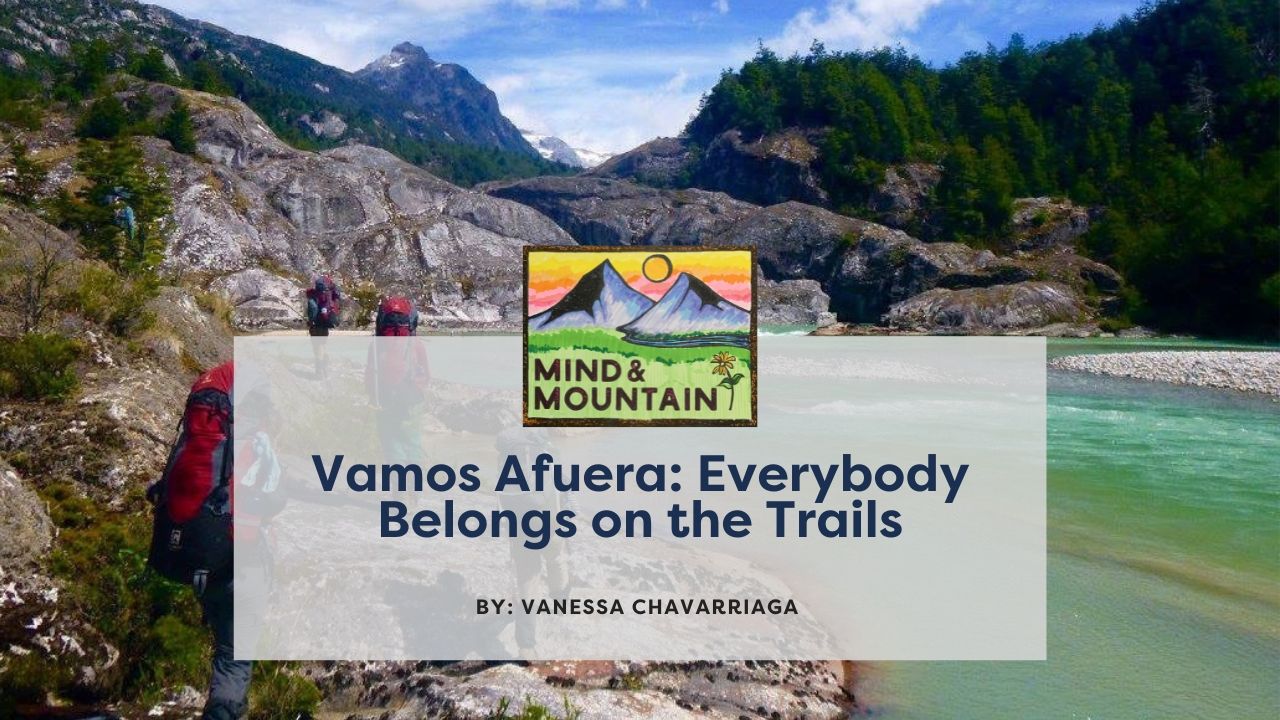Vamos Afuera: Everybody Belongs on the Trails

Expanding the Narrative of Being 'Outdoorsy'
This is a guest blog by Mind & Mountain friend & team member Vanessa Chavarriaga. Vanessa is a columbian, mountain athlete, environmental sociologist & outdoor advocate, who immigrated to the United States during her childhood.
Read on for more of her story:

I grew up on the lush hillsides of Colombia, with a waterfall and a banana tree in my backyard. My childhood was a mix of color and diversity and the lines between inside spaces and outside spaces were always blurred.
After immigrating to the United States in my later childhood, I quickly learned that the way people in the US interact with the outdoors is quite different, and in a lot of ways less accessible. Here, being an outdoor recreationist is associated with having the right type of gear, body, ability, partners, and knowledge. I am grateful for my multicultural upbringing because it has allowed me to challenge this, and expand the narrative of who belongs outdoors. (Spoiler: everyone belongs outdoors!)

In Colombia, most days are welcomed by a sunrise walk or a slow cup of coffee as the light hits the trees. Because the Colombian ecosystem is so abundant and bio-diverse, nature often infiltrates human-made spaces. In the houses, windows are almost always open and birdsong fills the rooms. The highways are sometimes almost entirely consumed by a green tunnel of trees, vines, and flowers. Waterfalls hug every corner. These are just a few examples of the ways nature seamlessly inserts herself in day to day life.
Although I spent most of my youth immersed in this ecosystem of abundance and welcomeness, I struggled to find a sense of belonging in American outdoor recreation culture for a long time. I didn’t consider myself an athlete because I didn’t play sports growing up, didn’t have trophies or records or any other claim to my name. I didn’t even consider myself outdoorsy because the ways I interacted with the outdoors were never validated by American culture. As a teenager in Michigan, I begrudgingly joined my mom for our afternoon walks. I remember her picking flowers, creating the most elaborate bouquets to bring home and fill our space with joy and color. I also remember being ashamed of this and hoping no one from school saw me. “Why can’t we camp or own a boat instead? Why can’t we go for a hike in a national park instead of walking around the neighborhood?” I would ask myself.
The Outdoors is a Space for All
As I grew up I continued to chase a very specific idea of outdoorsy: I slowly acquired the “right” gear, climbed the “right” mountains, and learned the “right” skills. I saved up money to take a mountaineering course in Patagonia. I suffered through the uphills and was the last one on the downhills. I thought hardship and suffering were a rite of passage, and that on the other side of these I would finally be accepted in the outdoor recreation community. On one of the harder days, my Chilean instructor Felipe passed down a token of wisdom that has stayed with me to this day: it’s just walking.
What we were doing on this course was simply going for a walk; just spending time outside. Every time he jokingly said this, I felt a wave of calmness wash over me. Walking was something I knew how to do—something I had been doing all of my life. With my family. Suddenly the family practice that had brought me so much shame as a teenager filled me with pride.

Many years have passed since that day in Chile, and I am doing more and more unlearning and growing in my beliefs of who belongs outdoors. I think it is paramount to reject exclusionary narratives and advocate for access to the outdoors for all. I believe it is a basic human right.
As an adult I have found it more and more important for our collective wellbeing that everyone has access to trails and places to experience outdoors. Whether this means climbing a mountain, going skiing, going for a run, or sitting by a river or drinking coffee outside with your abuela -- all of these activities belong in nature. I currently live in Wyoming because the sweeping skylines and open spaces connect me with nature in ways I never had access to as a child. And even though I moved here for the climbing and skiing, some of my favorite memories here are simply going for a walk with a friend or a sunset run on the pathways.


I also believe that there are no hierarchies when it comes to outdoor recreation activities; they are all just as valuable as the next. Some of my favorite outdoor activities include going for long runs alone and, when in Colombia, sitting outside watching monkeys with my grandmother. One of these activities is not superior to the other, even though the “conquer” mentality around the outdoors can lead us to believe so. It’s important to remember that there is space for all of us here, and we can all enjoy nature in our own ways.
About the Author:
Vanessa is a mountain athlete and environmental sociologist who focuses on the intersection of people and nature. As an immigrant and woman of color herself, Vanessa recognizes the systemic barriers that purposefully keep BIPOC out of outdoor spaces. Taking up space in the outdoor community feels revolutionary. Follow Vanessa on her journey diversify the outdoors on Instagram @vanessa_chav.

